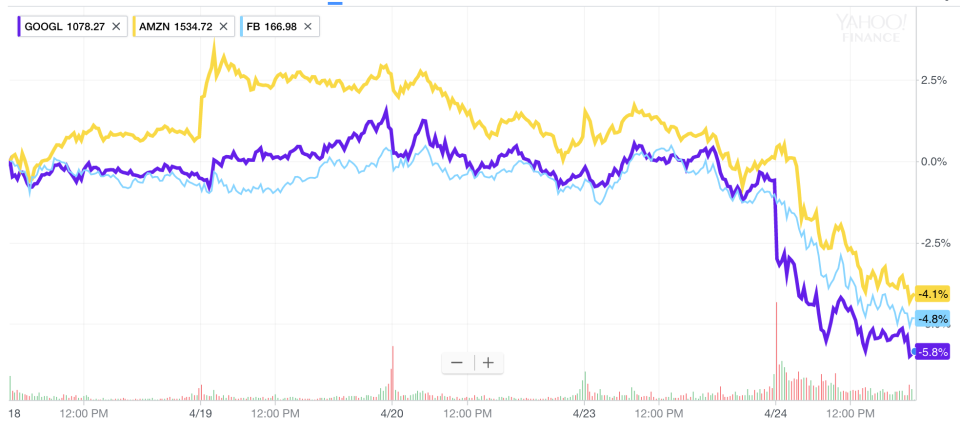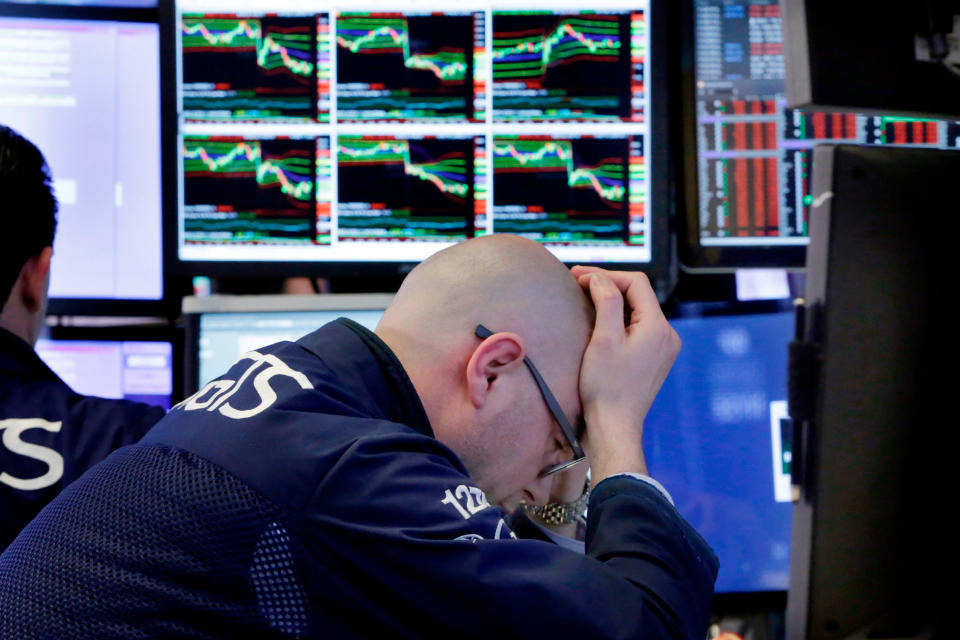Stocks are getting smoked, and companies can't step in to stop it
Stocks are getting smoked on Tuesday.
Each of the major U.S. indexes was in the red, with the Dow seeing the biggest losses, falling 2.2%, or 550 points, while the S&P 500 was also down 1.7% and the Nasdaq was down 1.9%.
The Dow was being dragged lower by shares of Caterpillar (CAT), down over 6% after having rallied earlier in the session following an earnings beat.
In the tech sector, shares of Google parent company Alphabet (GOOGL, GOOG) were down more than 4.5% after reporting earnings on Monday after the market closed. Also lower in sympathy with Alphabet shares were other tech leaders Facebook (FB) and Amazon (AMZN), both down nearly 4%.

Earlier in the session, the 10-year Treasury yield topped 3% for the first time since 2014, a move that had been long-awaited by investors as rates have moved up steadily throughout 2018.
Torsten Sløk, chief international economist at Deutsche Bank, said Tuesday that, “Stocks are too worried about 3% today. The earnings season is going really well and at the macro level corporate America has plenty of cash and hence little borrowing needs, so companies are not impacted much by higher long rates.”
Bespoke Investment Group noted Tuesday that between Monday’s close and Tuesday’s market open, 80 companies reported earnings. On average, these stocks rose 1.45% after results but were down an average of more than 2% since the market open on Tuesday.

And this selling pressure could be exacerbated by a lack of corporate buyers, as strategists out of Goldman Sachs highlighted over the weekend.
“80% of S&P 500 firms are in their buyback blackout windows, which means that volatility will likely remain elevated during the next several weeks,” strategists at Goldman Sachs led by David Kostin said. “Since 2000, volatility has typically been higher during blackout periods compared with non-blackout periods given the absence of corporate demand to support share prices.”
In February when stocks fell sharply from an all-time high in just a few days, corporate buyers were seen as buoying markets. A lack of corporate buyers in late March was seen as adding to the pressure stocks came under after the Federal Reserve’s interest rate hike on March 21.
And with many companies still in a blackout period that typically spans the weeks leading up to and the day or two after an earnings report, new buybacks that are not done as part of a pre-set plan can’t be executed. In other words, executives for a company set to report earnings over the next week can’t go to the market to buy back shares of the company today.
When this blackout lifts, 2018 should still end up being a strong year for corporate buybacks, with Kostin noting that S&P 500 companies should end up repurchasing $650 billion worth of stock this year, a 23% increase over 2017.
—
Myles Udland is a writer at Yahoo Finance. Follow him on Twitter @MylesUdland
Read more from Myles here:

